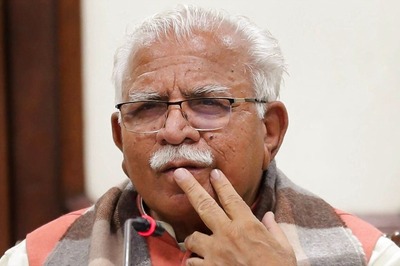
views
Bangalore: It began in 1981, in Pune.
Seven young middle-class friends, most of them co-workers at a small software company, quit their jobs to chase a dream: to build a global software company in a country with few computer-users and a socialist-style economy that rarely rewarded entrepreneurship.
And the risk has paid off.
Twenty-five years on, repeated surveys say Infosys Technologies Ltd., now headquartered in high-tech Bangalore, is India's most admired company, and the outsourcing giant is the country's best-known brand in the global market.
Starting Sunday, the company that writes software for such firms as Goldman Sachs and JC Penny celebrates its 25th anniversary in Mysore, at its new engineering training centre.
Among other events, the celebrations will include remotely ringing Monday's bell to open trading on the Nasdaq stock exchange in New York - the first time an Indian company will do so, and the latest in a string of Infosys firsts.
Infosys was India's first global company, with more than 90 per cent of its US$ 2.1 billion in annual revenues coming from overseas.
It was also the first in India to adopt a code of corporate transparency, offer stock options to employees and list shares in the United States on the Nasdaq in 1999.
Today, many young Indian engineers shun offers from global giants like IBM to work at Infosys, where just one of every 100 applicants is accepted.
"We have demonstrated that it is possible to be world-class from India," said Chairman N R Narayana Murthy, who, as a principal founder, had to borrow money from his wife to set up the company with just Rs 10,000.
"Today, no matter where you go in India, if you talk to entrepreneurs in the country, they would say, 'We want to be like Infosys,' " said Murthy, whom Time magazine ranked among the world's 25 most influential businessmen in 2001.
That said the company faces formidable challenges.
With the founders still dominating Infosys' top rungs and with most of them in their early 50s, a number of high-level executives have left in recent years, frustrated by their inability to rise.
Also, competition is mounting quickly. Where Infosys and its Indian peers once had much of the software outsourcing industry to themselves, companies such as IBM and Accenture are now spending enormous sums to create and expand their own Indian operations.
Infosys will find it difficult to keep its profit margins at current levels because industry salaries are rising fast, said Shankar Sharma, director of First Global, a Bombay-based brokerage firm.
PAGE_BREAK
"This is one area where we definitely see a problem," Sharma said. "The top line may continue to be robust, but (profit) margins will shrink."
But there have always been challenges.
Infosys' culture is hardly typical of India, a country where businesses long thrived on government protection and tax manipulation and where a tiny clique of family-owned conglomerates dominated the corporate world.
Even today, Infosys isn't India's biggest software company. Tata Consultancy Services - an arm of a family conglomerate makes nearly US$3 billion in annual revenue.
And while its competition thrived on government contracts in those early outsourcing days, Infosys always looked abroad for customers.
That wasn't easy. There were no venture capital firms then to pump up the company, and India had many currency restrictions.
Through the 1980s, there were few big contracts. The founders kept their salaries low, says Nandan Nilekani, now the company's chief executive, who in the early days would share a scooter with co-founder SD Shibulal as they drove around Bangalore looking for business.
But they had ambition.
"Even when they were a small company, they had a global vision," said Avinash Vashistha, chief executive of Tholons, a Bangalore-based consulting firm. "The company was never distracted from its vision... You don't often see that happening here."
The first major break came in 1991, with a contract from Canadian telecommunication equipment maker Nortel Networks, Vashistha said. As the months passed, a few more contracts trickled in, slowly bringing the company into global reckoning.
Still, revenues totaled just US$ 100 million in 1999, a fraction of its rivals' earnings.
But when the dotcom bubble burst in 2000, it proved a blessing as scores of cost-slashing US companies began shifting software development and back-office work to India, with its low wages and educated workforce.
Between 1999 and 2004, Infosys' revenues grew tenfold, reaching US$ 1 billion.
With many experts doubting the company could sustain such growth, revenue doubled in the following two years, now totaling a little over US$ 2 billion annually.
It didn't always go so well. When Infosys shares were first offered on the Indian stock market in 1993, there were not enough buyers.
But the US$ 1 invested in the company then is now worth US$ 3,300.




















Comments
0 comment